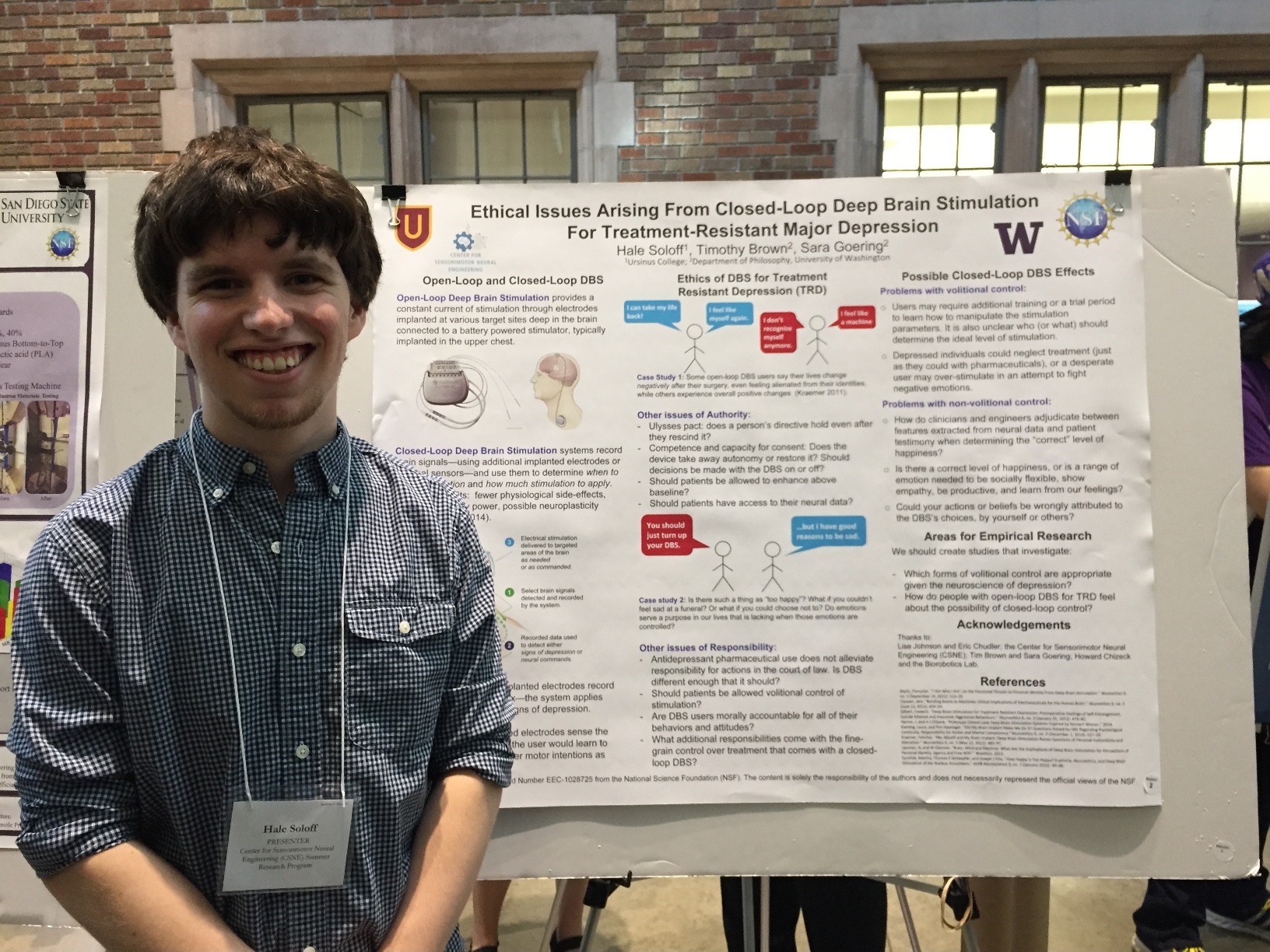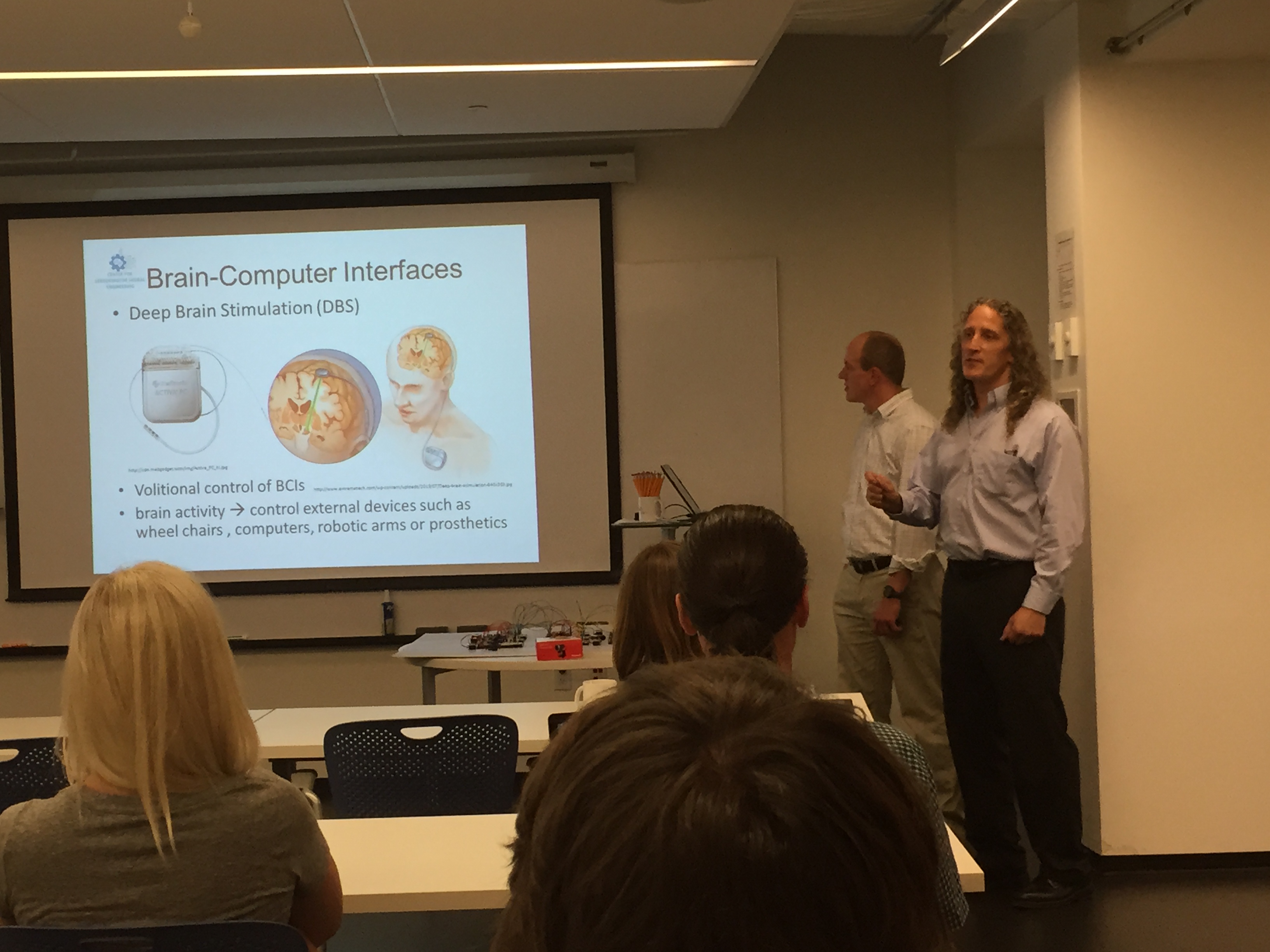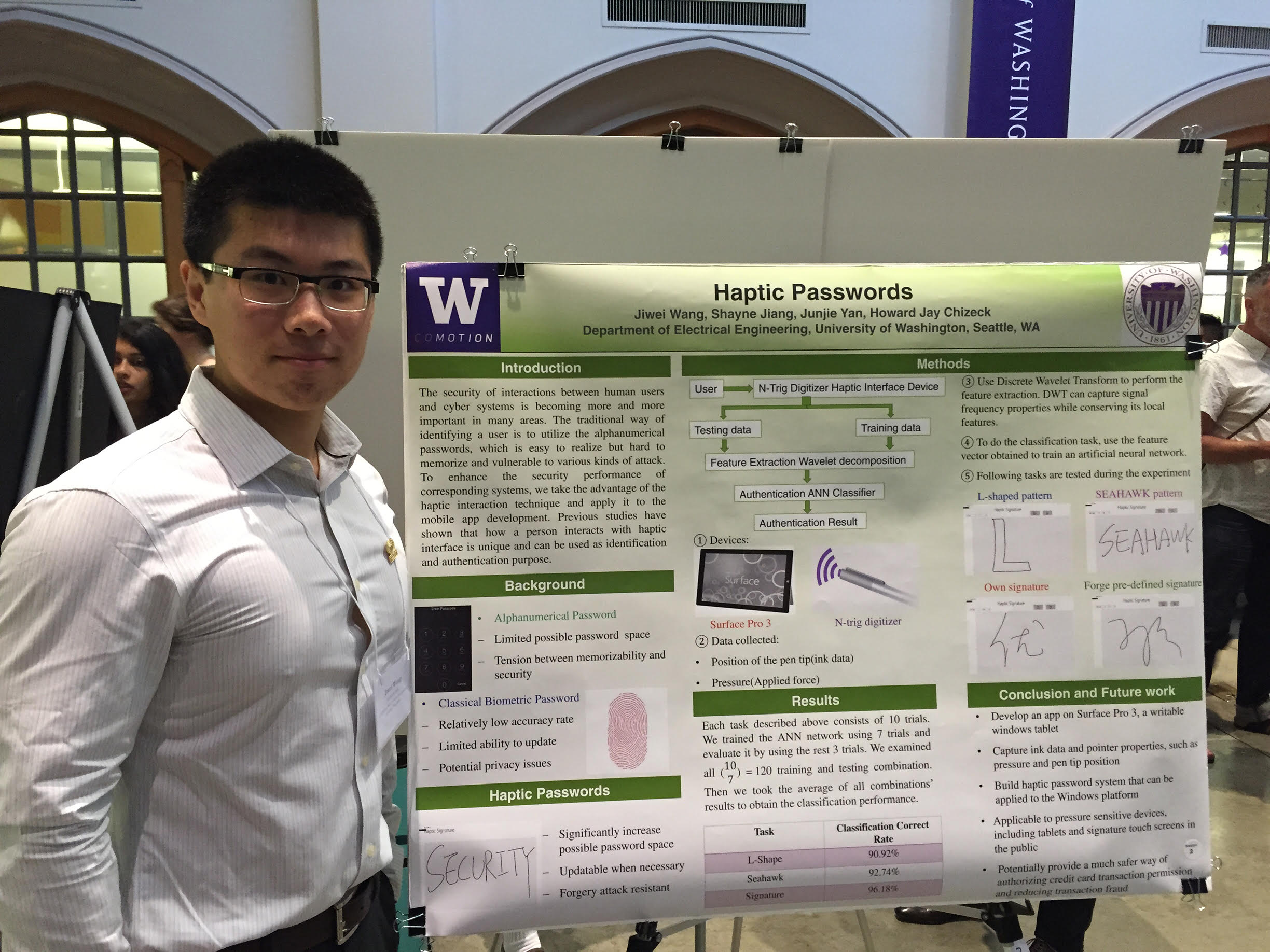Over the last couple months the BRL has hosted some great summer researchers. We hosted several undergraduate and two local high school teachers who worked side-by-side BRL graduate students and faculty on advancing some of the lab’s ongoing projects. The topics that they worked on included from the neuroethics of DBS for depression, new password methods, and including haptic feedback into BCI tasks. They all produced excellent work over the summer and we wanted to take the opportunity to highlight their accomplishments here. A big thanks goes out to our summer researchers for dedicating so much time towards advancing the lab’s research!
Hale Soloff, an under graduate neuroscience research student from Ursinus College, joined the Neuroethics thrust at the Center for Sensorimotor Neural Engineering’s Research Experience for Undergraduates (REU) program (more information here). He teamed up with the BioRobotics Laboratory to analyze ethical issues surrounding the use of new closed-loop deep brain stimulation (DBS) technology for the treatment of depression.
graduate neuroscience research student from Ursinus College, joined the Neuroethics thrust at the Center for Sensorimotor Neural Engineering’s Research Experience for Undergraduates (REU) program (more information here). He teamed up with the BioRobotics Laboratory to analyze ethical issues surrounding the use of new closed-loop deep brain stimulation (DBS) technology for the treatment of depression.
Acknowledging a gap in the literature of how deep brain stimulation affects moral understanding, Hale tackled questions of authority and responsibility; can someone with DBS be held accountable for all of their actions, or does the device exert undue influence on behavior, attitudes, and decision making? Does the device take away its user’s capacity for consent and free will, or does it restore that capacity which the depression took away? How much control should patients with depression have over their own DBS, and thereby their own emotions? Is there such a thing as the “correct” level of happiness, and does the patient, clinician, policy maker, DBS engineer, or somebody else get to make that decision? And finally, how does a closed-loop stimulator, which can record and analyze brain activity to adjust stimulation accordingly, change the answers to these questions? Hale was guided by mentor Tim Brown and PI Sara Goering in studying the moral discussions surrounding open-loop DBS, and by working closely with Dr. Howard Chizeck and the BioRobotics Lab to learn more about closed-loop DBS he raised new relevant questions as to how this technology affects its users and those around them.
Hale says about his research, “The way the public and media perceive new medical technologies like closed-loop DBS is very important. Exploring these questions is the first step to educating future patients, clinicians, and lawmakers about how these devices work and affect us.”
 Two local high school teachers went back to school this summer in the BioRobotics Lab. Larry Bencivengo, a veteran Biology teacher from Mercer Island High School, and Paul Zimmer, who teaches Chemistry at South Kitsap high school, spent 7 weeks in the BRL as part of CSNE’s Research Experience for Teachers (RET) program. Bencivengo and Zimmer were part of a cohort of 6 teachers who worked part time in one of the labs associated with CSNE while also developing curriculum which they will pilot in their classrooms this school year. Read more about the CSNE RET Program here.
Two local high school teachers went back to school this summer in the BioRobotics Lab. Larry Bencivengo, a veteran Biology teacher from Mercer Island High School, and Paul Zimmer, who teaches Chemistry at South Kitsap high school, spent 7 weeks in the BRL as part of CSNE’s Research Experience for Teachers (RET) program. Bencivengo and Zimmer were part of a cohort of 6 teachers who worked part time in one of the labs associated with CSNE while also developing curriculum which they will pilot in their classrooms this school year. Read more about the CSNE RET Program here.
The task that these two “teacher-students” took on relates to ongoing research in the BRL, led by doctoral candidates Jeffrey Herron and Margaret Thompson, to train patients to gain greater control of BCIs such as Deep Brain Stimulators used to suppress Parkinsonian tremors. Zimmer and Bencivengo attempted to incorporate haptic feedback into a BCI training program developed by Herron and Thompson by using the Phantom Omni haptic mouse. They were successful in learning to incorporate haptic properties into Unity, the game development platform that Thompson and Herron used to develop the current version of the BCI training program. The virtual sense of touch provided by the Phantom Omni promises to improve patient performance in BCI training. Thanks to the research at BRL, these training programs may soon be used to help patients learn to control a computer mouse or other external device with their BCIs, and may eventually allow patients to exert volitional control of their DBS devices.
Zimmer traveled two hours each way back and forth from his home in Port Orchard in order to participate in the RET program. Bencivengo said, “The past 7 weeks working in the BRL have been among the most exiting and challenging of my teaching career – I can’t wait to get back into the classroom this fall to share all of the amazing things that I learned this summer! I can’t express adequate thanks to Dr. Chizeck and all of the amazing people at the CSNE and BRL for this incredible opportunity!” You can read more about our ongoing closed-loop DBS and BCI work here.
 Jiwei Wang, a CoMotion Mary Gates Scholar from the University of Washington, worked in the BioRobotics Laboratory as an intern (more information here) . He worked with Junjie Yan and Jiang Shayne on the Haptic Passwords project, in which they built an app using the haptic password system that can be applied to the Windows platform.
Jiwei Wang, a CoMotion Mary Gates Scholar from the University of Washington, worked in the BioRobotics Laboratory as an intern (more information here) . He worked with Junjie Yan and Jiang Shayne on the Haptic Passwords project, in which they built an app using the haptic password system that can be applied to the Windows platform.
They realized that the security level of the interactions between human users and cyber systems is becoming more and more important in many areas. The traditional way of identifying a user is to utilize the alphanumerical passwords, which is easy to realize but hard to memorize and vulnerable to various kinds of attack. To enhance the security performance of corresponding systems, we take the advantage of the haptic interaction technique and apply it to the mobile app development. Previous studies show that how a person interacts with haptic interface is unique and can be used as identification and authentication purpose. We applied this technique to different platforms and found that the Surface Pro 3 was the best suitable device. One of the key reasons was that its pen, the N-trig digitizer, provided us with its API and made it easier to transfer data to the haptic password system. By developing an app on a writable windows tablet, we successfully capture ink data and pointer properties such as pressure and orientation. Then, we invited subjects to take specific tests, and after data analysis, we found that this system is solid and secure because of its good performance and forgery attack resistance. Additionally, this system is so user friendly that it not only is easy to learn, but also provides a complex but intuitive way of creating signature passwords. This haptic interaction technique can be applied to those pressure sensitive devices, such as tablets and signature touch screens in the public. This could provide a much safer way of authorizing credit card transaction permission and reducing transaction fraud.
As a full-time intern, Jiwei spent a lot of time in the BioRobotics Lab. Jiwei said, “This lab is amazing! People are all really professional on their projects and are always willing to help. Many many thanks to Dr. Chizeck’s patience and help! This is my best summer research experience and I’m looking forward to work with all of you in the future!”